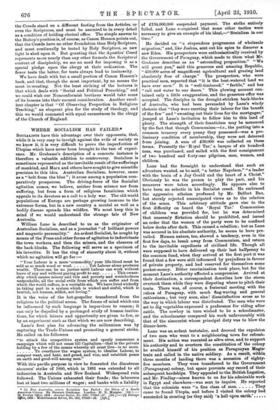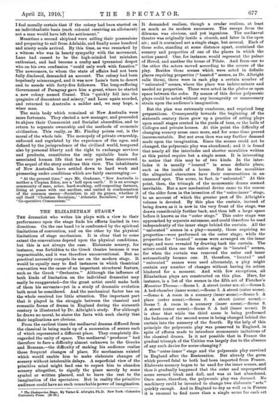WHERE SOCIALISM HAS FAILED.*
SOCIALISTS have this advantage over their opponents, that, while it is very easy to inveigh against the evils of society as we know it, it is very difficult to prove the imperfection of Utopias which have never been brought to the test of experi-
ence. Mr. Grahame's description of a concrete instance is therefore a valuable addition to controversy. Socialism is sometimes represented as the inevitable result of the sufferings of mankind, and Marx and others have sought to give scientific precision to this idea. Australian Socialism, however, came as a " bolt from the blue" ; it arose among a population com- paratively prosperous. The driving-force of the Socialist agitation comes, we believe, neither from science nor from suffering, but from a form of religious fanaticism which appeals to its devotees as a call to a holy war. The old-world populations of Europe are perhaps growing immune to the extremer forms, but in a new country a mental as well as a bodily disease spreads like wildfire. We must keep this in mind if we would understand the strange tale of New Australia.
William Lane is described to us as the originator of Australian Socialism, and as a journalist " of brilliant powers and magnetic personality." An ardent Socialist, he sought by means of the Press and other forms of agitation to indoctrinate the town workers, and then the miners, and the shearers of the back-blocks. The following will serve as a specimen of his invective. It has the ring of sincerity about it, without which no agitation will go far :—
"Your Labour is a mere 'commodity,' your life-blood must be
sold as so much wood or wool Yet Labour alone produces wealth. There can be no justice until Labour can work without
leave of any and without paying profit to any This owner- ship which causes misery and vice and poverty and wretchedness unspeakable, all the social evils from which you suffer and from which the world suffers, is a veritable sin. We have lived wickedly in taking part in a system which is wicked and sinful, which is brutish, not human, selfish, not loving."
It is the voice of the hot-gospeller transferred from the religious to the political arena. The frame of mind which can be influenced by such language is impervious to reason; it can only be dispelled by a prolonged study of human institu- tions, for which leisure and opportunity are given to few, or by an experiment such as that which we are now describing.
Lane's first plan for advancing the millennium was by capturing the Trade-Unions and promoting a general strike. He called on his followers
"to attack the competitive system and openly commence a campaign which will not cease till Capitalism—that is the private holding by a few of the means whereby all must live—is no more.
To overthrow the wages system, to idealise Labour, to conquer want, and hate, and greed, and vice, and establish peace on earth and good-will among men."
With this pacific purpose in view he fomented the disastrous shearers' strike of 1890, which in 1891 was extended to all industries in Australia and New Zealand. Widespread ruin followed. The Unions exhausted their funds ; the labourers lost at least two millions of wages; and banks with a liability • (1) New Australia, where Socialism has Failed the Story of a South American Colony. By Stewart Grahame. London: E. ItIOr8n11. [6,11' @/Foreign Offiee,1894: Annual Series, No. 1867, 07293-27. [5d.]—(3) Foreign °Ace, 1896: Miscellaneous Series, No. 588, 07682-19. E1td.1
of £134,000,000 suspended payment. The strike entirely failed, and Lane recognised that some other tactics were necessary to give an example of his ideal,—" Socialism in our time."
He decided on " a stupendous programme of wholesale migration," and, like Joshua, sent out his spies to discover a new Eden. His prospectors were enthusiastically received by the Government of Paraguay, which made to them what Mr. Grahame describes as an " astounding proposition." " We will grant you," said this generous and amazing Republic, " 450.000 acres of magnificent agricultural and grazing land absolutely free of charge." The prospectors, who were practical men, reported that "it is the best-watered land we have ever seen." It is " well-timbered," " fertile," and has " rail and water to our doors:' This glowing account con- tained only a little exaggeration, and the generous offer was accepted. The disciples in the drought-stricken back-blocks of Australia, who had been persuaded by Lane's windy rhetoric that " they were exerting their labour for the benefit of the few " and " sweating out their lives for the mortgagee," jumped at Lane's invitation to follow him to this land of plenty. The strength of their fanaticism may be measured by the fact that though Communism—i.e., the putting into a common treasury every penny they possessed—was a pre- liminary condition of membership, they were not deterred from joining. A sum of £30,000 was collected on these terms. Presently the Royal Tar,' a barque of six hundred tons, was purchased, and sailed with the first consignment of two hundred and forty-one pilgrims, men, women, and children.
Lane had the foresight to understand that such an adventure wanted, as he said, "a better Napoleon," "a leader with the brain of a Jay Gould and the heart of a Christ." Obviously he was the person to play the part, and his measures were taken accordingly. He appears also to have been an eclectic in his Socialist creed. He embraced the aggressive atheism professed by Mr. Belfort Bax, but sternly rejected emancipated views as to the relation of the sexes. This arbitrary attitude gave rise to the first difficulty on board the 'Royal Tar.' Communism of children was provided for, but he was determined that unseemly flirtation should be prohibited, and issued an order that the women of the party were to be confined below decks after dark. This caused a rebellion ; but as Lane was secured in his absolute authority, he seems to have pre- vailed. Human nature, too, showed a tendency, even in the first few days, to break away from Communism, and return to the inevitable expedients of civilised life. Though all were supposed to have delivered up their last halfpenny to the common fund, when they arrived at the first port it was found that a few were still influenced by prejudices in favour of private property, and had reserved for themselves some pocket-money. Bitter recrimination took place, but for the moment Lane's authority effected a compromise. Arrived at their destination, a correspondent describes how the storm overtook them while they were disputing where to pitch their tents. There was, of course, a fraternal meeting with the rulers of Paraguay, with much flag-waving and general enthusiasm ;. but very soon, alas ! dissatisfaction arose as to the way in which labour was distributed. The men who were set to dig vegetables expressed a preference for riding after cattle. The cowboy in turn wished to be a schoolmaster, and the schoolmaster compared his work unfavourably with that of the sinecurist whose principal duty was to blow the dinner-horn.
Lane was an ardent teetotaler, and decreed the expulsion of two men who went to a neighbouring town for refresh- ment. His action was resented as ultra tires, and to support his authority and to overturn the constitution of the colony he availed himself of his position as Paraguayan Magis- trate and called in the native soldiery. As a result, within three months of landing there was a secession of eighty- five members. They were transferred to the Government (Paraguayan) colony, but space prevents any record of their subsequent hardships. They appealed to the British Legation, and Mr. Findlay—since known to us for his admirable work in Egypt and elsewhere—was sent to inquire. He reported
that the colonists were "a fine class of men They came to found Utopia, and before I visited the colony had
succeeded in creating (as they said) 'a bell upon earth.'
I feel morally certain that if the colony had been started on an individualistic basis (each colonist receiving an allotment) not a man would have left the settlement."
Meantime a second shipload were selling their possessions and preparing to sail from Adelaide, and finally some hundred and ninety souls arrived. By this time, as was remarked by
a witness who was in hearty sympathy with the movement, Lane had ceased to be the high-minded but mistaken enthusiast, and had become a crafty and tyrannical despot
who on his own confession " could only work with fanatics." The newcomers, to whom the state of affairs bad not been fully disclosed, demanded an account. The colony had been hopelessly mismanaged, and it was now Lane's turn to desert and to secede with forty-five followers. The long-suffering Government of Paraguay gave him a grant, where he started
a. new colony named Cosine. This " quickly fell into the quagmire of discontent and misery," and Lane again seceded, and returned to Australia a sadder and, we may hope, a wiser man.
The main body which remained at New Australia were more fortunate. They elected a new manager, and proceeded
to abjure their Communist and Socialist absurdities, and to return to separate ownership and the methods of economic civilisation. This really, as Mr. Findlay points out, is the moral of the whole tale. The monopoly of private ownership, enforced and regulated by the experience of the ages, and defined by the jurisprudence of the civilised world, tempered also by personal liberty and the right to exchange services and products, constitutes the only equitable basis for associated human life that has ever yet been discovered. The sequel of the story confirms this view. The inhabitants of New Australia have settled down to hard work and pioneering under conditions which are fairly encouraging :-
" At the present time," says Mr. Grahame, "New Australia is neither a Utopian Eden, nor a hell upon earth! It is an average community of sane, sober, hard-working, self-respecting farmers, living at peace with one another, and united in condemnation of the common enemy—Socialism in all its guises, whether it call itself Christian Socialism,' `Atheistic Socialism,' or merely
Co-operative Communism!"















































 Previous page
Previous page